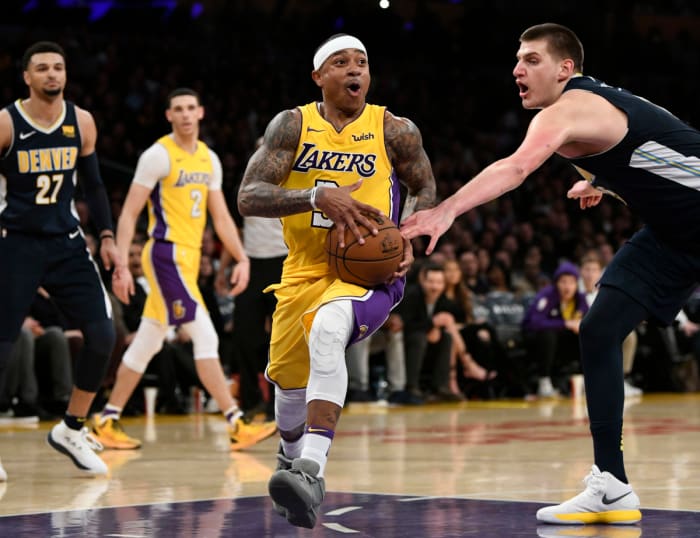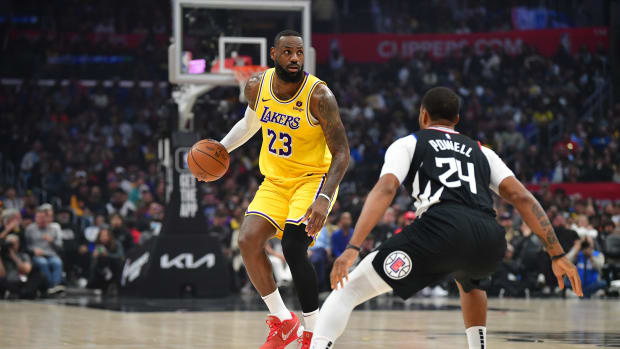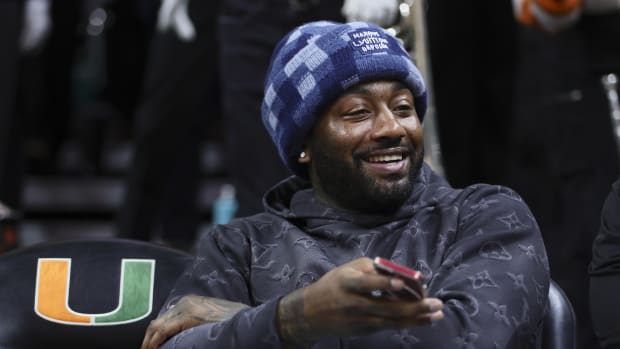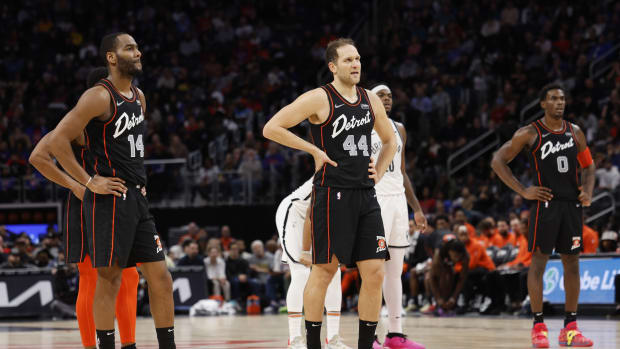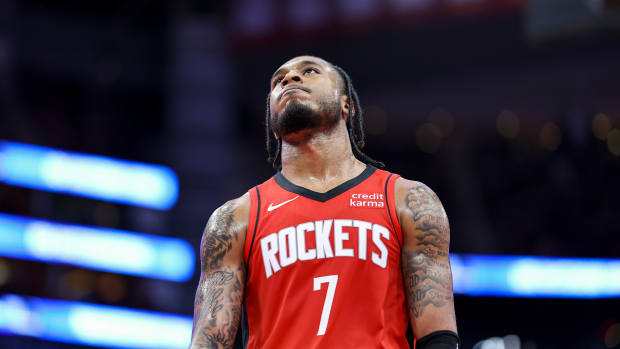After a Nightmare Year, Will Isaiah Thomas Find His Way With the Nuggets?
Isaiah Thomas lay on the floor of the TD Garden, pointing to his chest as the Boston crowd showered him with “MVP” chants. He had just picked up his 50th point of the night—he’d go on to score three more—in an overtime win that gave the Celtics a 2–0 lead over the Washington Wizards in the Eastern Conference semifinals. With a 53–29 record, Boston had captured the top seed in the East and appeared to have one of the most promising futures in the NBA, and Thomas, standing just 5'9", was the team’s catalyst. His sister, Chyna, would have turned 23 that day. Instead, he endured those playoffs with a heavy heart after she had been killed in a car accident days before the postseason began.
Thomas, at age 28, had come to personify the culture, system and hard work that defined Brad Stevens’s Celtics. A two-time castoff in Sacramento and Phoenix, the last pick of the 2011 draft played with a frantic edge sharpened by years of fighting for his NBA life. In Boston, he finally got an opportunity—perhaps his last—to prove himself, and became an All Star, All-NBA honoree and MVP candidate. In 2017, he became one of only three players in NBA history to average at least 28 points and five assists on better than a 62% true shooting percentage. He turned in an all-time scoring season for a guard and earned a place in Boston lore.
Grades: Cavs Make Kevin Love Face of the Franchise With Four-Year, $120 Million Extension
On July 16, he signed a one-year, $2 million contract with the Nuggets to back up Jamal Murray. Perhaps no superstar in recent memory has fallen off as precipitously and as quickly as Thomas has over the last 12 months, and his saga should serve as a cautionary tale against the pitfalls of anticipatory reveling in one’s worth. Just months after Thomas finished fifth in MVP voting, Boston chose to invest its future in the younger Kyrie Irving. A nagging hip injury stripped Thomas of the burst and change of direction that helped make him such a prolific scorer, and an effort to play through the pain rendered him unavailable for the first 36 games of last season and reduced his value to a nadir.
Thomas didn’t help matters in Cleveland, airing grievances via the media and struggling to accept a diminished role in a new ecosystem. Couple that with ineffectiveness on the court, and his Cavs tenure never got off the ground. Recently, he confessed to ESPN’s Adrian Wojnarowski that he rushed himself back onto the court before fully healthy. “That was too soon, a mistake,” Thomas said. “I should have waited until after the All-Star break.” He wasn’t the same player and seemed reluctant to admit it. The same fearlessness and brash confidence that made him endearing in Boston came off as selfish and obtuse in Cleveland. Thomas was moved again at the trade deadline, this time to Los Angeles in a deal that overhauled virtually half of Cleveland’s roster. He proved mildly effective in a bench role for the Lakers before having season-ending hip surgery in March, just over a year after he first injured it.
Accepting decline—particularly in the prime of a player’s career—is a difficult realization for athletes as prideful and hungry as Thomas, and it’s hard not to feel some degree of sympathy for him. He risked millions of dollars and his short-term health in attempt to lead his team to greater heights, served as the figurehead of his franchise and won over a passionate fanbase, only to be shipped out of town for what the team viewed as an upgrade. Danny Ainge was well within his rights to make that deal, but that doesn’t make it sting any less.
More than anything, Denver offers Thomas a fresh start and a chance to restore his value and prove he can remain healthy. “People are scared of my hip now,” Thomas told Wojnarowski. “I just had to be real with myself. I had to understand that it’s not going to be about money this summer. I’ve got to show people that I can play—and play at a high level again. And I will.”
If all goes well, the fit could be mutually beneficial. Thomas played under Michael Malone in Sacramento, and has a clearly-defined role as a scoring spark off the bench. Playing alongside Nikola Jokić in the Nuggets’ pass-happy offense should allow him to move without the ball and receive it with an advantage. That approach unlocked the full extent of Thomas’s abilities in Boston; he’d zip around screens into dribble handoffs with Al Horford, or steer his man into a screen and dart the other way.
Denver will be able to deploy him in many of the same ways. Malone isn’t quite as creative as Stevens, but the Nuggets generate advantages through unpredictable ball and player movement. If Thomas makes himself a more willing cutter, he’ll find some of those same lanes open to him. A pick-and-roll tandem with Jokić could be deadly. He likely won’t run as much isolation in Denver or have as many sets catered to his liking, and his ability to create separation and change direction may never reach peak levels again.
What's Behind the Lakers' Bizarre Offseason?
How Thomas operates without the ball in his hands is still something of a mystery at this point in his career, and even playing primarily in bench units, there will still be some overlap with Murray, Gary Harris, and Will Barton. Still, the Nuggets need scoring and Thomas, if he can provide it efficiently, can be of great help.
Ideally, Thomas won’t spend more than a year in Denver, and instead hit the open market again in 2019, when several teams will have significant cap space. It’s a cruel fate for someone in Thomas’s position to fall so far from the heights of stardom. But he knows better than anyone how to fight his way back up.






























